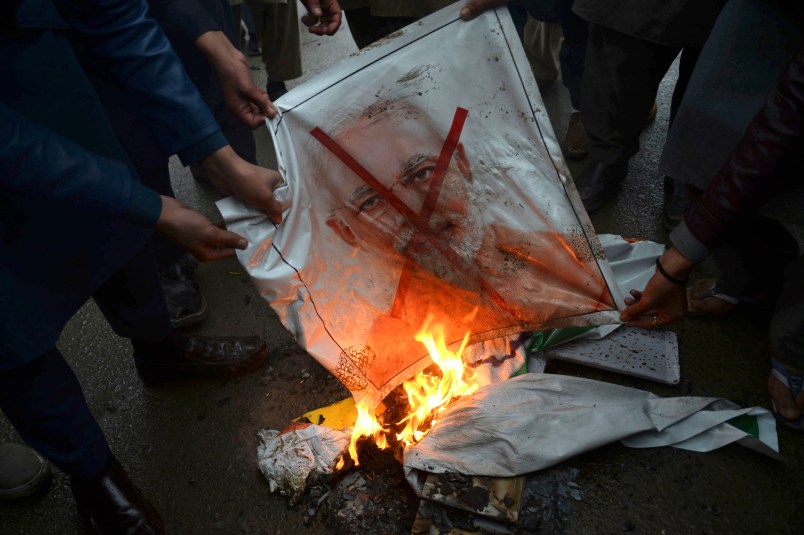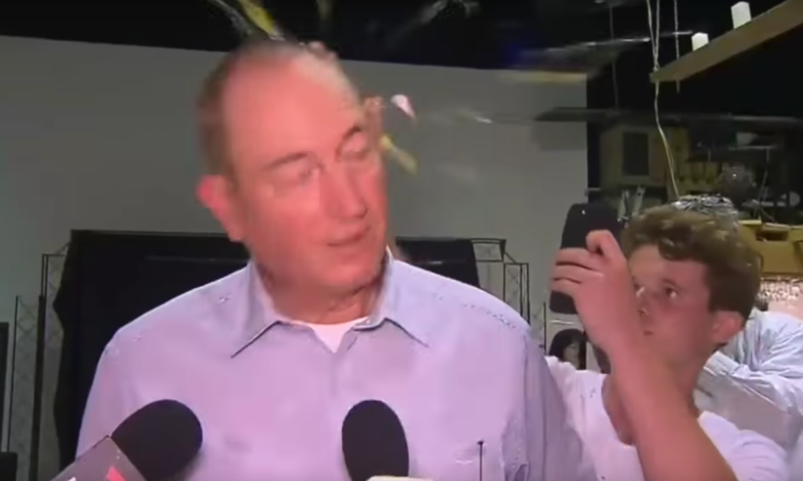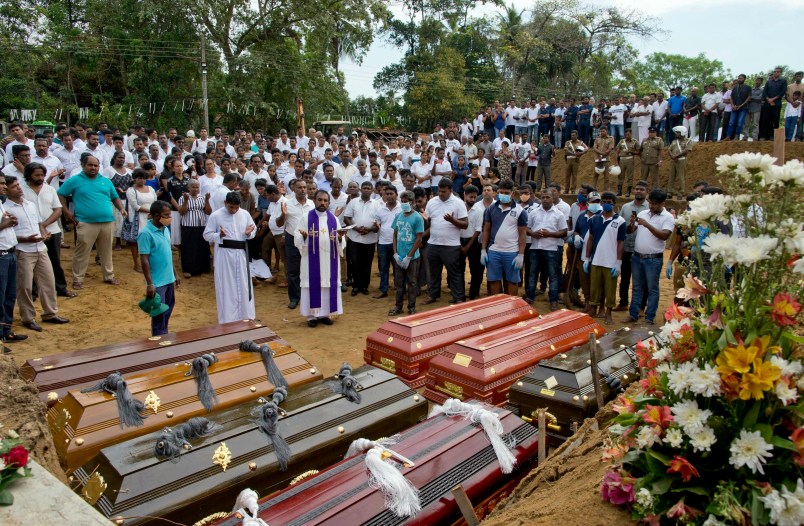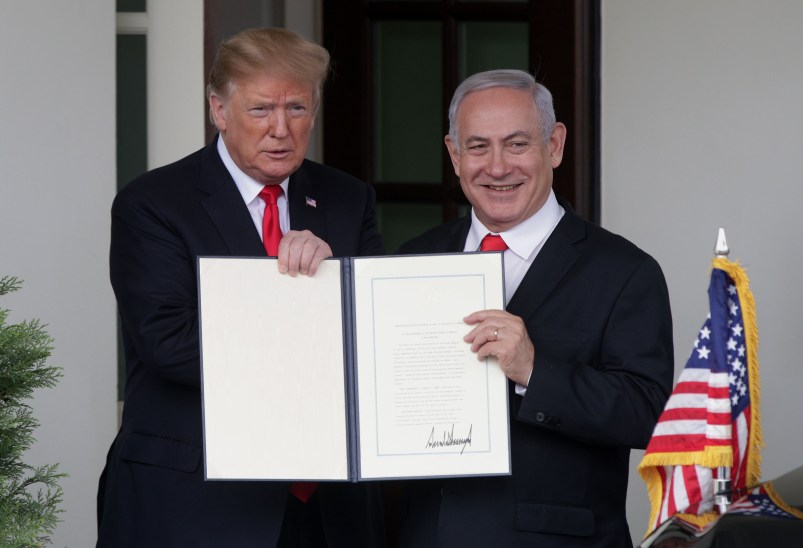BALAKOT, Pakistan (AP) — Tensions escalated sharply on the Asian subcontinent Tuesday with nuclear-armed neighbors Pakistan and India trading accusations and warnings after a pre-dawn airstrike by India that New Delhi said targeted a terrorist training camp.
Pakistan said there were no casualties, while New Delhi called the attack a pre-emptive strike that hit a terrorist training camp and killed “a very large number” of militants.
The airstrike followed a suicide bombing in India’s section of the disputed territory of Kashmir on Feb. 14 that killed more than 40 Indian soldiers. Pakistan has denied involvement in the attack but vowed to respond to any Indian military operation against it.
Several reporters, including an Associated Press journalist, trudged up the Kangaran Nallah hill to the site of Tuesday’s bombing near the town of Balakot, close to the border with Pakistan’s sector of Kashmir. They saw several large craters, a few upended trees and villagers wondering why they had been targeted.
“There are only mud-brick homes here. There is no madrassas. There isn’t even a concrete house,” said 55-year-old Noor Shah who lived about a half-kilometer (a third of a mile) from the site.
When the bombs struck, Shah said residents of his village of Jabba stayed indoors. It wasn’t until morning when “we saw soldiers and learned from them that Indian planes dropped bombs in our village,” he said.
Two of the dried mud structures were damaged in the explosions but no one was hurt, said Tahir Khan, 45, of the same village. He added that his frightened children refused to let him leave their side to go to work.
“No one has been killed, no one has been seriously hurt. But we want to know, what have we done that we were attacked?” asked Khan.
Pakistan’s military spokesman, Maj. Gen Asif Ghafoor, said Indian planes crossed into the Muzafarabad sector of Pakistani-controlled Kashmir. He said Pakistan scrambled its warplanes and the Indian jets released their payload “in haste” near Balakot.
India’s Foreign Secretary Vijay Gokhale told reporters in New Delhi that Indian fighter jets targeted Jaish-e-Mohammad camps in a pre-emptive strike after intelligence indicated another attack was being planned.
“Acting on intelligence, India early today struck the biggest training camp of Jaish-e-Mohammad in Balakot,” he said. “In this operation, a very large number of Jaish-e-Mohammad terrorists, trainers, senior commanders and jihadis being trained were eliminated.”
Balakot Police Chief Saghir Hussain Shah said he had sent teams to the area where the Indian bombs reportedly hit, which he described as a mostly deserted wooded area. He said there were no casualties and no damage. There was no immediate explanation for the differing accounts, although India and Pakistan routinely contradict one another.
The Feb. 14 attack was the worst on Indian forces since the start of the 1989 insurgency in Kashmir and came as Indian Prime Minister Narendra Modi is in a re-election campaign.
Addressing a rally of former soldier’s in the Indian state of Rajasthan hours after the airstrike, Modi said India was in “safe hands.”
“I vow that I will not let the country bow down,” he said.
Pakistani Foreign Minister Shah Mahmood Qureshi condemned Tuesday’s incursion, saying New Delhi had “endangered” peace in the region for political gains.
Pakistan Prime Minister Imran Khan dismissed India’s account of the airstrike on a terrorist training camp as “self-serving, reckless and fictitious.” Earlier this month, Khan had authorized the army to “respond decisively and comprehensively to any aggression or misadventure” by India, after New Delhi vowed a “jaw-breaking response” to the Kashmir suicide bombing.
Pakistan has vowed to help investigate the suicide bombing and to take action against anyone found to be using Pakistani soil for attacks on India. It also offered to hold a dialogue with India on all issues, including terrorism.
Kashmir, which is split between the two countries but claimed by each in its entirety, has been the cause of two wars between the neighbors. They fought a third war in 1979 over East Pakistan, which gained independence with the help of India and became Bangladesh.
Insurgents in Indian-controlled Kashmir have been demanding either outright independence or union with Pakistan. India routinely accuses Pakistan of arming and training militants who cross the mountainous Himalayan region.
The Pakistan-based militant group Jaish-e-Mohammad claimed responsibility for the suicide bombing. The bomber, who made a video beforehand, was a resident of Indian-controlled sector of Kashmir.
Muhammad Amir Rana, a security analyst and executive director of the Islamabad-based Pakistan Institute of Peace Studies, urged the international community to move quickly to de-escalate tensions.
“It’s quite critical and it is important that the international community intervene quickly to start a peace process between India and Pakistan,” he said, adding that the United States, China and Russia should take the lead.
China, a close ally of Pakistan, urged both sides to show restraint.
“We hope that both India and Pakistan can … take actions that will help stabilize the situation in the region and help to improve mutual relations,” said China’s Foreign Ministry spokesman Lu Kang.
Pakistan has outlawed Jaish-e-Mohammad and seized its property in south Punjab’s Bawahalpur area, including religious schools and mosques. India has demanded that Jaish-e-Mohammad’s leader, Azhar Masood, be listed as a terrorist by the U.N., but that has been stymied by China.
After the airstrike, Lt. Col. Devender Anand, an Indian army spokesman, said Pakistani soldiers attacked Indian positions along the boundary in Kashmir, the so-called Line of Control. He called the attack an “unprovoked” violation of the 2003 cease-fire. He said there were no casualties and refused to discuss India’s incursion into Pakistan.
Residents of Chikhoti, on the Pakistani side of the Line of Control, said they heard the roar of Indian jets overhead. They said they had been expecting an Indian response to the suicide bombing.
“We built bunkers near our home years ago and we will use them if there is any attack from India in our area,” said Mohammad Shafiq, 55.
Later Tuesday evening, Anand said Pakistani soldiers fired mortar shells and small-arms fire along the Line of Control at the Nowshera, Poonch and Akhnoor sectors, prompting Indian troops to “strongly and befittingly” respond.
Shakir Ahmed, a resident of Poonch in Indian-controlled Kashmir, said people heard loud sounds of shelling.
“People are afraid. It’s getting dark,” he said. “We pray it doesn’t escalate into war.”






